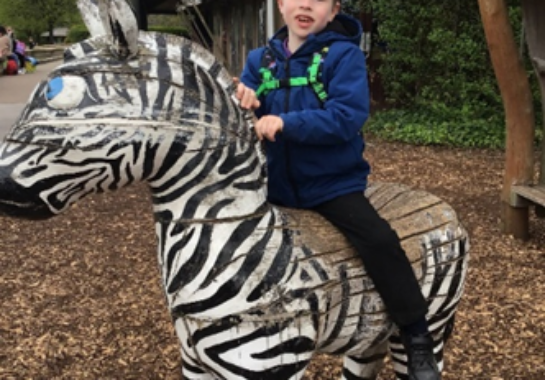7 year old William has been taking part in a clinical trial at Alder Hey to help improve the treatment of congenital hyperinsulinism
Clinical trials help scientists to find new treatments, modify use of existing treatments, help prevent diseases and improve care. By volunteering to take part in research and with the support of his mother, William is playing a crucial part in testing how we manage treatment of a condition called congenital hyperinsulinism (CHI).
What is Congenital Hyperinsulinism?
CHI is a rare and challenging disorder from birth, effecting an estimated 1 in 30,000 people. It is characterized by inappropriate and unregulated insulin secretion from the beta-cells of the pancreas. In CHI, the beta-cells release insulin inappropriately all the time and insulin secretion is not regulated by the blood glucose level (as occurs normally). The action of insulin causes hyperinsulinaemic hypoglycaemia.
High insulin levels prevent ketone bodies being made. This means that the brain is not only deprived of its most important fuel (glucose), but also ketone bodies which are used as alternative fuels.
William’s Clinical Trial
William is part of an international research trial led by Zealand Pharma that has recruited research participants with CHI from the EU, Israel, UK and USA. The study medicine is called dasiglucagon, and is similar to the natural hormone and medicine called glucagon. Glucagon increases blood sugar and is used to treat low blood sugars (hypoglycaemia). Glucagon can be given by injection but cannot be given continuously by a pump for home treatment, as the medicine forms clumps and becomes ineffective. In contrast to glucagon, dasiglucagon is more stable, does not form clumps and stays in the body for longer. Dasiglucagon can be given continuously under the skin by a pump. The research study will compare the effectiveness of treatments for CHI.

William is also autistic and is not able to share his message about the research study, but his mother Amanda says he “always had a smile on his face during every visit”. Amanda says she felt excited about being approached for William to be part of a research study at Alder Hey “as new drugs don’t come along often for such a rare disease and the current medication that William was on was having to be increased a lot more than it should. I was thrilled that other children with hyperinsulinism would also benefit from the outcome of the trial.”
Amanda wanted William to take part in research at Alder Hey as she “could see the benefits it would give him. Living with a life threatening condition can be extremely hard to manage with very little medicines to help keep your child stable. Clinical trials mean there is hope for William’s future to help keep him safe.”
With regards to the family’s experience of research at Alder Hey, Amanda advised that it “has been positive due to the friendly supportive staff. Both the clinical research nurses and doctors have been extremely knowledgeable, professionally and most of all compassionate and caring.” William has received his research study treatment at the NIHR Alder Hey Clinical Research Facility (CRF).
Emma Carter, the lead research nurse for William’s research study along with research nurses based at the CRF, has got to know him well over the past 2 years, and says William was “a little apprehensive at first but now seems happy to be there, and we can tell he looks forwards to coming to the CRF. William is a unique character and getting to know him has been great. We hope that the treatments being studied will help William and other children in the future with this condition. Clinical trials offer hope to many people and help us find better treatments for others in the future.”
Amanda would also like to add that “the endocrine team have been phenomenal in giving the highest quality of care to William over the last 8 years and as a family we cannot thank them enough.” Amanda would “highly recommend other parents take part in clinical studies as it is a step forward for ground breaking treatments.”
Dr Senthil Senniappan, Clinical Director for Endocrinology and Principal Investigator for the study said that “we are glad that we are able to run this study at Alder Hey despite all the challenges during COVID-19, thanks to the support from the clinical research team as well as the patients and families who have been very committed from the start.”
